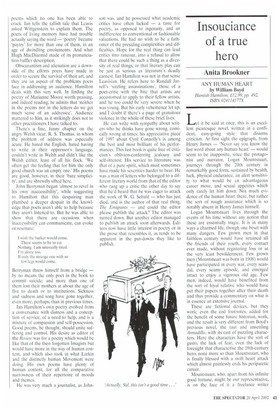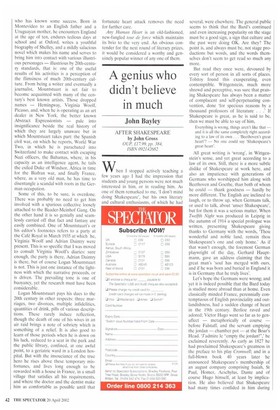Insouciance of a true hero
Anita Brookner
ANY HUMAN HEART by William Boyd Hamish Hamilton, £12.99, pp. 492, ISBN 024114177X
Let it be said at once, this is an excellent picaresque novel, written in a confident, easy-going style that disarms criticism. At first sight the epigraph, from Henry James — 'Never say you know the last word about any human heart' — would seem to be inapposite, since the protagonist and narrator, Logan Mountstuart, journeys through the 20th century in remarkably good form, sustained by health, luck, physical endurance, an alert sensitivity to what would be an advantageous career move, and sexual appetites which only rarely let him down. Not much evidence of the human heart there, but rather the sort of rough assurance which is so notably absent in Henry James himself.
Logan Mountstuart lives through the events of his time without any notion that these are essentially tragic. It is in many ways a charmed life, though one beset with many dangers. Few grown men in that faithless century would have retained all the friends of their youth, everycontact ever made, without registering loss or at the very least bewilderment. Few grown men (Mountstuart was born in 1908) would have participated in every war, every scandal, every seamy episode, and emerged intact to enjoy a vigorous old age. Few men, indeed, would have benefited from the sort of loyal relative who would have put their papers together after their death and thus provide a commentary on what is in essence an extensive journal.
These are fictional devices, but they work; even the cod footnotes, added for the benefit of some future historian, work, and the result is very different from Boyd's previous novel, the taut and unsettling Armadillo, with its cast of puzzling characters. Here the characters have the sort of gusto, the lack of fear, even the lack of foresight that characterise the 18th-century hero, none more so than Mountstuart, who is finally blessed with a swift heart attack which almost painlessly ends his peripatetic career.
Mountstuart, who, apart from his infinite good fortune, might be our representative, is on the face of it a freelance writer who has known some success. Born in Montevideo to an English father and a Uruguayan mother, he encounters England at the age of ten, endures tedious days at school and at Oxford, writes a youthful biography of Shelley, and a mildly salacious novel which makes his name and serves to bring him into contact with various illustrious personages — illustrious by 20th-century standards, that is: one of the useful results of his activities is a perception of the flimsiness of much 20th-century culture. From being a writer and eventually a journalist. Mountstuart is set fair to become acquainted with many of the century's best known artists. Those dropped names — Hemingway, Virginia Woolf, Picasso, and, when he is operating as an art dealer in New York, the better known Abstract Expressionists — pale into insignificance beside the real history of which they are largely unaware but in which Mountstuart takes part: the Spanish civil war, on which he reports, World War Two, in which he is parachuted into Switzerland to make contact with escaping Nazi officers, the Bahamas, where. In his capacity as an intelligence agent, he tails the exiled Duke of Windsor, Africa in time for the Biafran war, and finally France, where, as a very old man, he has time to disentangle a scandal with roots in the German occupation.
Some of this, to be sure, is overdone. There was probably no need to get him involved with a spurious collective loosely attached to the Baader-Meinhof Gang. On the other hand it is so genially and seamlessly carried off that fact and fantasy are easily combined. One of Mountstuart's or his editor's footnotes refers to a party at the Café Royal in March 1935 at which he, Virginia Woolf and Adrian Daintry were present. This is so specific that I was moved to consult Virginia Woolf's diaries: sure enough, the party is there, Adrian Daintry is there, but of course Logan Mountstuart is not. This is just one instance of the lightness with which the narrative proceeds, or is driven. The prevailing tone is one of buoyancy, yet the research must have been considerable.
Logan Mountstuart pays his dues to the 20th century in other respects: three marriages, two divorces, multiple infidelities, quantities of drink, pills of various descriptions. These rarely induce reflection, though the death of one of his wives in an air raid brings a note of sobriety which is something of a relief. It is also good to learn of those periods when he is down on his luck, reduced to a seat in the park and the public library, confined, at one awful point, to a geriatric ward in a London hospital. But with the insouciance of the true hero he rises above these temporary misfortunes, and lives long enough to be rewarded with a house in France, in a small village that satisfies all his requirements, and where the doctor and the dentist make him as comfortable as possible until that fortunate heart attack removes the need for further care.
Any Human Heart is an old-fashioned, new-fangled tour de force which maintains its brio to the very end. An obvious contender for the next round of literary prizes, it would be considered a worthy and genuinely popular winner of any one of them.







































































 Previous page
Previous page